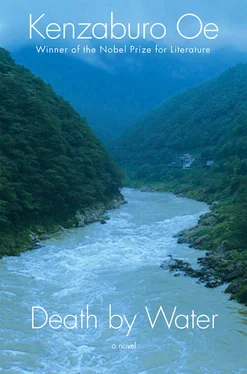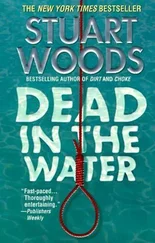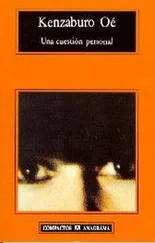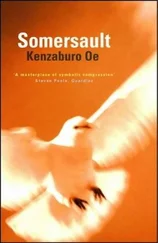“In my formal proposal, I tried to persuade the funding committee to finance this project by explaining how I would portray this entity, who transcends reality, as a tangible flesh-and-blood person. The question was, should I have him appear onstage as a character fully endowed with physical form, or would I simply try to make the audience aware of his presence while he remained invisible? My thought was that in terms of dramatic impact, simpler would be better. I basically lifted all the raw materials for the characterization from your collected works and jotted them down on index cards. By the way, I picked up the index-card technique from reading your essays, back in my university days.
“At our practice space in Matsuyama, we’ve used your descriptions of Kogii as inspiration for the creation of a doll: a sort of three-dimensional cloth figurine. Unaiko made a prototype by sewing together some pieces of fabric and then stuffing the shell. If the doll ends up being part of the final staging, we’ll place it as high as possible above the stage, in a place where the audience will still be able to see it. We actually did something similar in another play, so we aren’t flying completely blind on this. Anyway, the doll version of Kogii will be looking down at the action and influencing the actors on the stage. Let’s call it the ‘Kogii effect.’
“The other day I was trying to figure out when Kogii first appeared in your work, and when I remembered that your friend Takamura once mentioned in an interview how much he liked a certain early work of yours, I went through my books and found the story in question.”
“Ah,” I said. “You’re talking about the one where a young composer imagines that his dead baby is floating in the sky, as big as a kangaroo and dressed in a white cotton nightgown. The apparition’s name is Aghwee.”
“That’s the one,” Anai said. “The narrator is a student who is working as a part-time personal assistant for the mentally unstable composer, and he thinks the giant creature his employer claims to see in the sky is nothing more than a delusional fantasy. Part of the narrator’s job description is to accompany the hallucinating composer on his rambles around Tokyo, and one day they’re walking down a narrow street when they happen to encounter a dog walker who is being dragged along by a boisterous pack of Doberman pinschers, all straining to escape their leashes. At any rate, the composer is busy trying to communicate with the giant kangaroo-size baby he sees in the sky — it’s the ghost of his brain-damaged child, whom he chose to starve to death shortly after its birth — and the narrator is overcome with panic, fearing he’s about to be engulfed in the scrum of dogs. Feeling utterly helpless, he shuts his eyes and tears begin to trickle down his face. Then someone touches his shoulder.”
I knew the entire passage by heart. “On my shoulder was a hand gentle as the essence of all gentleness; it felt like Aghwee touching me,” I recited.
“That’s it!” Masao exclaimed, clapping his hands. “When I reread the story, it occurred to me that what the young narrator perceived as Aghwee’s palm touching his shoulder was, in fact, the hand of Kogii. So I wrote a scene in which Kogii, just like the giant ghostly baby floating in the sky above Tokyo, gazes down from a high place at the novelist below — that is, at Kogito Choko. Hang on a sec, let me read you the ending, where the narrator has been hit in the eye and blinded by a stone thrown by a bunch of inexplicably frightened children.
“It was then that I sensed a being I knew and missed leave the ground behind me like a kangaroo and soar into the teary blue of a sky that retained its winter brittleness. ‘Good-bye, Aghwee,’ I heard myself whispering in my heart. And then I knew that my hatred of those frightened children had melted away and that time had filed my sky during those ten years with figures that glowed with an ivory-white light, I suppose not all of them purely innocent. When I was wounded by those children and sacrificed my sight in one eye, so clearly a gratuitous sacrifice, I had been endowed, if for only an instant, with the power to perceive a creature that had descended from the heights of my sky.”
Masao Anai’s reading of the words I had written so long ago had a powerful impact on me. I felt as though I had just heard, with my own ears, indisputable evidence of his very real talent as a stage director.
“As I’ve illustrated,” Masao said, “we’ve been talking about making the metaphor of Kogii a focal point. (We can discuss what he represents later on, although it seems fairly obvious.) But there’s another approach, which would be to have Unaiko add her own interpretation to the basic premise. The Caveman Group isn’t rigidly organized by any means, and I think our flexibility might actually end up having a stimulating effect on the work you’re about to undertake as well. The truth is, unlike in the past, university scholars don’t seem to be specializing in the work of Kogito Choko these days, so maybe this collaboration of ours will help to revive your waning popularity, even a little.”
“Really, Masao?” Asa said sharply. “I mean, I’ve told you that my brother is inclined to be skittish about this type of situation, and when you say snarky things you’re running the risk of making him back away from the entire project. Let’s just forge ahead slowly and hope we can all be reciprocally inspired by our creative activities. You were saying that Unaiko might have a different perspective, so how about it, Unaiko? How do you feel about this?”
Unaiko had been listening intently, looking like a little girl with an old-fashioned ponytail who had grown into a woman without changing much at all, but now she wiped the pensive expression off her face and addressed the group. “I have a very active interest in this project,” she said, “and I think it will be a meaningful collaboration for Masao and for Mr. Choko as well. Actually, there’s something I’d like to ask Mr. Choko privately at some point, if it could be arranged.”
“You’d better be careful,” Asa warned, but her tone was light. “When you try to get too close to my brother, he tends to run away. Ha ha ha! He really has his work cut out for him, though — he has to wade through all the musty old materials in the red leather trunk. I have my own feelings of ambivalence about the project, so I would be happier if he didn’t rush into it.”
After making that somewhat inscrutable remark, Asa paused and glanced at her watch. “Okay, then,” she said, turning to me. “It’s almost time for the youngsters to return from their little jaunt. You’re probably going to be relying on them for quite a bit of shuttle service from now on, so why don’t you be a sport and invite them to stay for dinner?”
4
The following Monday morning at nine o’clock on the dot, the Caveman Group’s minivan once again rolled up in front of the Forest House bearing Masao Anai, Unaiko, and the two young troupe members who had helped with the poetry stone. Hoping to avoid the morning rush hour, the little party had left Matsuyama at six A.M., and the predawn departure had evidently taken a toll on the two younger men. They greeted me with faces that seemed to say, Sorry, we’re still half-asleep! but just a few minutes later, in a spectacular burst of energy, they were hard at work alongside Asa, converting part of the first floor of the house into a small theater.
The two young men were clearly no strangers to manual labor, and the task at hand — setting up the Forest House as a communal workplace and rehearsal space — definitely required physical strength. Asa and Unaiko had hatched this plan earlier, and Asa had managed to quell my initial objections by assuring me the changes would only be temporary. The layout of the Forest House (which Asa had already been allowing the Caveman Group to use for rehearsals) was quite well suited to such activities. The previous day, Asa had done the basic cleaning by herself, and now she was supervising her newly arrived workforce.
Читать дальше










